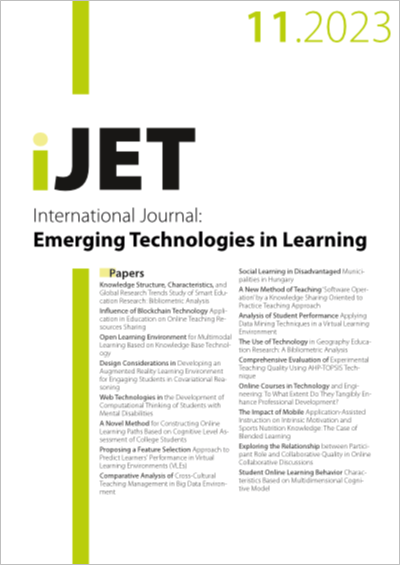Student Online Learning Behavior Characteristics Based on Multidimensional Cognitive Model
DOI:
https://doi.org/10.3991/ijet.v18i11.41083Keywords:
multidimensional cognitive model, cognitive level, online learning behavior, behavior feature representationAbstract
Analysis of student learning behavior characteristics is an important means for educators to better understand students and improve the quality and effectiveness of teaching in the field of education. It is necessary to refer to students' cognitive levels for analysis of student learning behavior characteristics. However, existing algorithms only focus on the overall performance and grades of students, ignoring the individual differences in learning cognitive levels among students, which affects the accuracy of the analysis results. Therefore, this paper conducts research on student online learning behavior characteristics based on a multidimensional cognitive model. Firstly, a multidimensional and multilevel model for evaluating students' cognitive levels is constructed, and the process of evaluating students' cognitive levels is sustainable and can be adjusted in real-time as students' cognitive levels change. By considering the differences in evaluation levels and students' cognitive levels, targeted observation and extraction of students' online learning behavior characteristics can be achieved. A new model based on variational autoencoder neural network is proposed to perform decoupled representation of students' implicit preferences. By using a regularization term based on maximum mean difference, the model can learn independent hidden vectors sensitive to dynamic and static factors from students' online learning behavior history data and multidimensional cognitive evaluation history data. The experimental results verify the effectiveness of the constructed model.
Downloads
Published
How to Cite
Issue
Section
License
Copyright (c) 2023 Nan Zhang (Submitter); Yuting Zhang

This work is licensed under a Creative Commons Attribution 4.0 International License.


